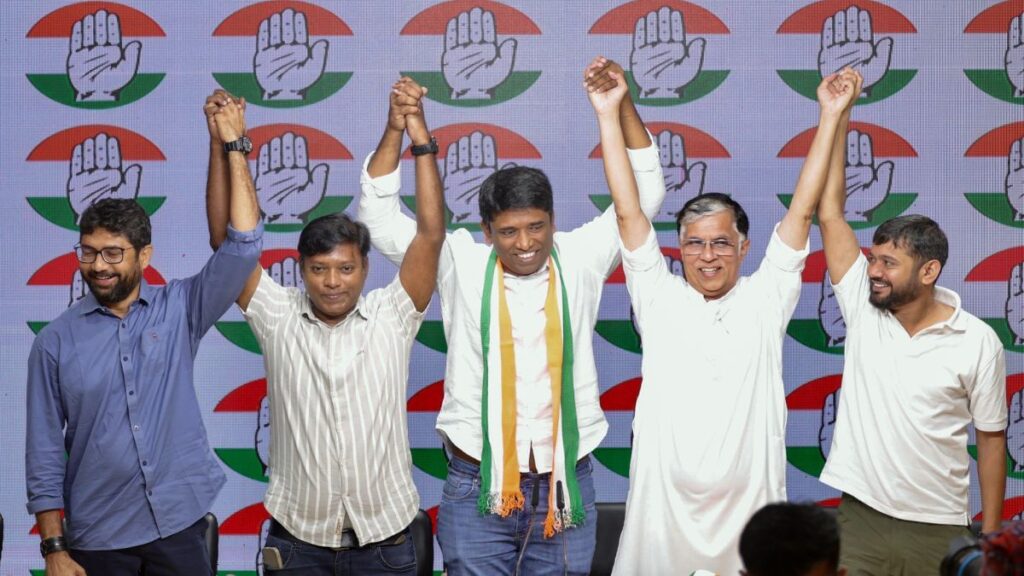New Delhi: Even though it has been six years since he resigned from the Indian Administrative Service (IAS), the government has not accepted his resignation, Kannan Gopinathan told ThePrint as he joined the Congress Monday.
“It has been six years, and there is no word on my resignation yet. Two months after I resigned, the government initiated proceedings against me for dereliction of duty and for speaking critically about the government to the media,” he said. “But it has been two-three years since that case was closed too. UPSC communicated to me that I have criticised the government while technically still being in the government, and therefore, my pay scale will be reduced. But I have not been receiving a salary, so what pay scale will be reduced?” he asked.
The case has brought to the fore once again the ambiguity of government rules when it comes to resignations of the country’s civil servants. Such is the confusion in Gopinathan’s case, that while some news outlets are referring to Gopinathan as an “IAS officer”, others are referring to him as an “ex-IAS officer”.
While there is no fixed timeline within which the government is bound to accept resignations, civil servants say a central notification can be issued within weeks if the administration so wishes. In a nutshell then, the question of resignations by civil servants is shrouded in complete ambiguity, amounting to extreme discretionary powers for the government.
Guidelines on the procedure to be followed in case an officer wishes to resign say: “It is not in the interest of government to retain an unwilling member of service. The general rule, therefore, is that a resignation of a member from service should be accepted.”
“Theoretically, nothing binds the government to accept the resignation even until the retirement of an officer,” said a former secretary of the Department of Personnel and Training (DoPT). “A law abiding officer can then go to the court and ask the court to intervene if they so wish. But as per the rules, the onus is on the officer, and not the government.”
A UPSC functionary too confirmed that the government has no obligation whatsoever to accept an officer’s resignation.
Shrouded in ambiguity
As stated above, in actuality, this ambiguity translates to enormous discretionary powers for the government.
For instance, while the government has not accepted Gopinathan’s resignation in six years, the resignation of his former colleague, who also left the IAS in 2019, Sasikanth Senthil, was accepted in 2022. Senthil, much like Gopinathan, had resigned from the service citing his disillusionment with the state of the Indian democracy under the Modi government.
Then there was the case of Jammu and Kashmir cadre IAS officer, Shah Faesal, who had quit service the same year, protesting against “unabated killings in Kashmir” and the “marginalisation of Indian Muslims at the hands of Hindutva forces”. The government did not accept his resignation for three years even when Faesal briefly joined the National Conference (NC), and later, started his own political party, called the J&K People’s Party. Along with scores of other political leaders in Kashmir, even Faesal was arrested under the Public Safety Act (PSA).
After three years, however, Faesal appeared to have a change of heart. In a cryptic statement, DoPT minister Jitendra Singh said in 2021, “When heart transplant is done you don’t say whether it was achieved through general anesthesia or local anesthesia. You say heart has been transplanted. Heart transplant has happened.” Faesal, formerly a bitter critic of the government, was subsequently reinstated in the government in 2022. He has since been in the ministry of culture, first as an under-secretary, and then as a director.
In several other cases, the government has been far more prompt in accepting the resignation of officers.
Consider the case of K. Annamalai, an IPS officer from Tamil Nadu, who much like Senthil and Gopinathan, resigned from service in 2019. While Annamalai resigned in May, his resignation was accepted by the government in October. The next year in August 2020, Annamalai joined the BJP.
Similarly, in 2022, Asim Arun, an IPS officer from the Uttar Pradesh cadre, opted for the Voluntary Retirement Scheme (VRS) to join the BJP. His VRS was approved within days. Arun is now a BJP MLA from Kannauj.
In the case of Aparajita Sarangi, a former IAS officer from Odisha, who resigned from service in 2019 too, the government approved her request for VRS within days. Sarangi then joined the BJP, and won the 2019 and 2024 Lok Sabha election from Bhubaneshwar.
Real consequences
“The resignation of many people who have resigned after me has been accepted by the government,” Gopinathan said. “It is not even like this is a VRS where the government owes me a pension or any benefits. Yet, they have chosen to sit on it.”
Ordinarily, a resignation automatically severs the relationship of an officer with the government, the former DoPT secretary explained. “The government can say that we won’t accept the resignation, and service rules will continue to apply to an officer, but it cannot really do anything to the officer.”
While the government’s acceptance of the resignation can be a mere formality in many cases, in others, the government’s inaction can result in trouble for the officer’s future prospects, as happened with Gopinathan. He could not join the private sector except as a consultant because the government would not accept his resignation, leading to financial problems for him, he said.
“This is definitely a pressure tactic,” the former DoPT secretary said. “Often, a new employer wants a relieving letter from your previous employer. If you don’t have one, it obviously is a source of potential employment problems,” he added. “There is a need to change the All India Service Rules to give some time frame, but who will do it? This system works for the government.”
(Edited by Viny Mishra)
Also read: Govt cannot go on bullying citizens: former IAS Kannan Gopinathan after joining Congress

